Travel and Tourism Sector Report: TUI Group and UK Policies
VerifiedAdded on 2020/07/22
|14
|3981
|38
Report
AI Summary
This report provides a comprehensive analysis of the travel and tourism sector, focusing on its structure, historical development, and the influence of government policies and international agencies. The report examines the factors affecting tourism demand, including marketing, political stability, technology, and environmental considerations, using the TUI Group as a case study. It further explores the impact of local and national policies on the sector's success, such as tax, interest rates, and environmental regulations. The analysis extends to the implications of political changes on tourism in different countries, contrasting politically stable and unstable environments. Additionally, the report assesses the positive and negative impacts of tourism on economic, social, and ecological factors, suggesting strategies to minimize negative impacts while maximizing positive ones. The report emphasizes the importance of sustainable development and the role of various stakeholders in shaping the future of the travel and tourism industry, particularly in the context of the UK and Chinese visitors.
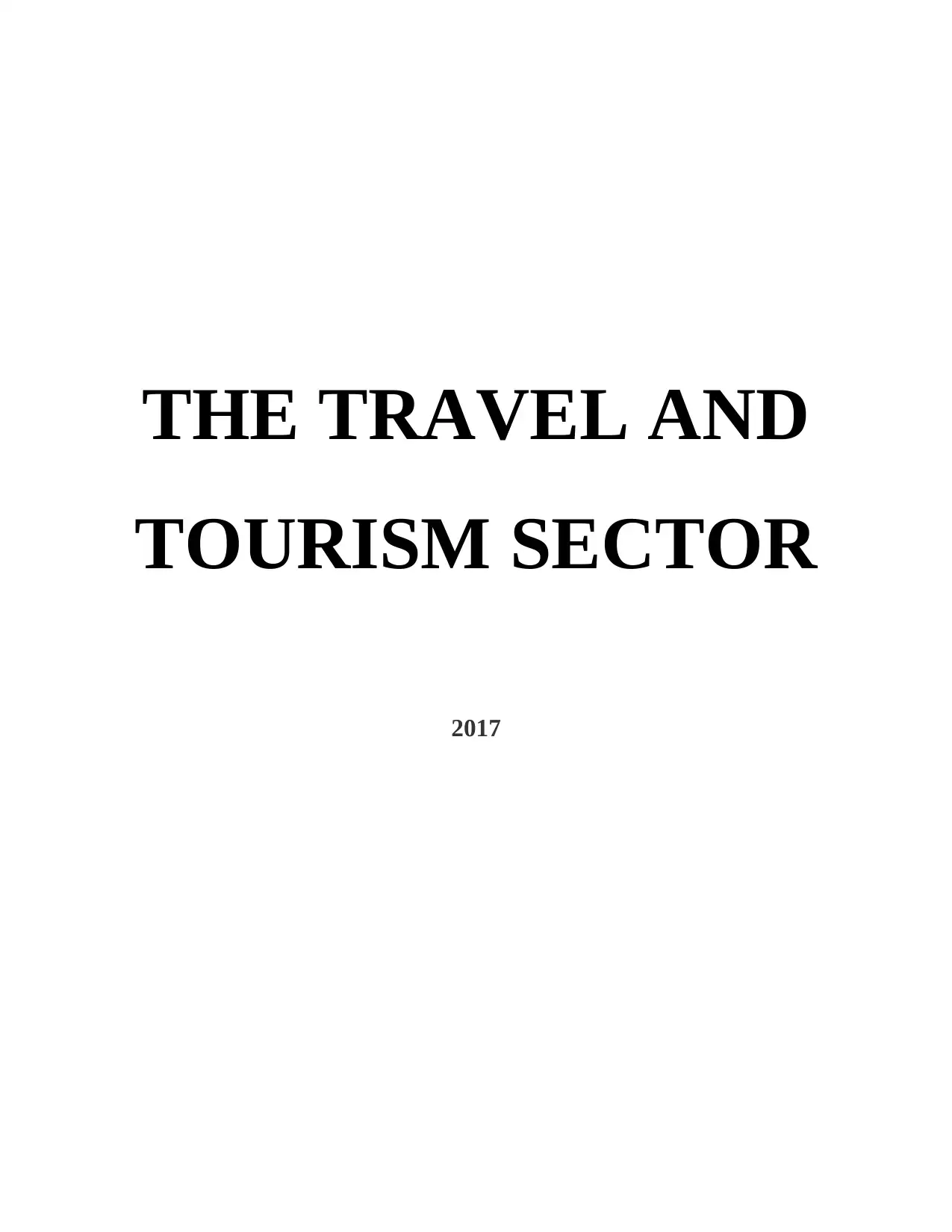
THE TRAVEL AND
TOURISM SECTOR
2017
TOURISM SECTOR
2017
Paraphrase This Document
Need a fresh take? Get an instant paraphrase of this document with our AI Paraphraser
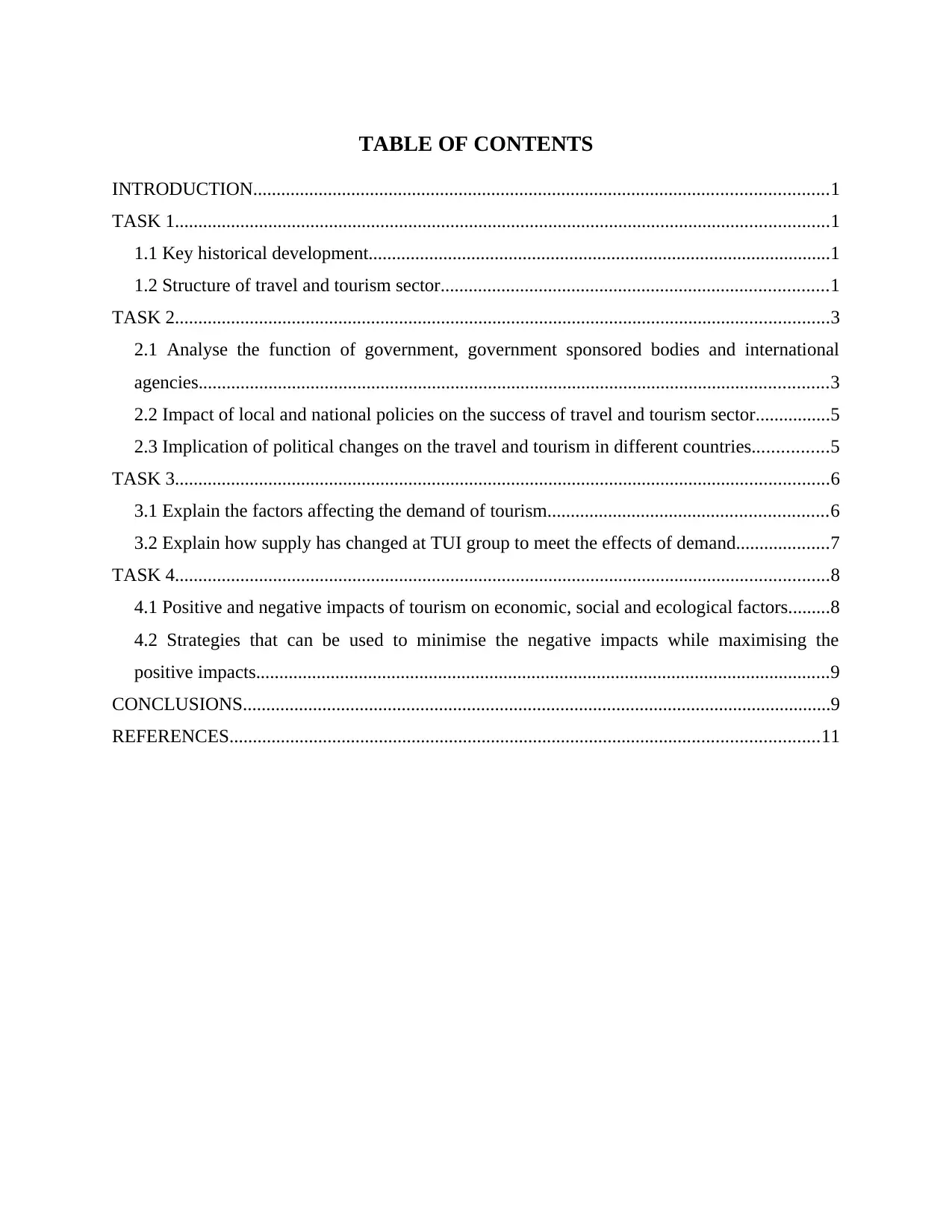
TABLE OF CONTENTS
INTRODUCTION...........................................................................................................................1
TASK 1............................................................................................................................................1
1.1 Key historical development...................................................................................................1
1.2 Structure of travel and tourism sector...................................................................................1
TASK 2............................................................................................................................................3
2.1 Analyse the function of government, government sponsored bodies and international
agencies.......................................................................................................................................3
2.2 Impact of local and national policies on the success of travel and tourism sector................5
2.3 Implication of political changes on the travel and tourism in different countries................5
TASK 3............................................................................................................................................6
3.1 Explain the factors affecting the demand of tourism............................................................6
3.2 Explain how supply has changed at TUI group to meet the effects of demand....................7
TASK 4............................................................................................................................................8
4.1 Positive and negative impacts of tourism on economic, social and ecological factors.........8
4.2 Strategies that can be used to minimise the negative impacts while maximising the
positive impacts...........................................................................................................................9
CONCLUSIONS..............................................................................................................................9
REFERENCES..............................................................................................................................11
INTRODUCTION...........................................................................................................................1
TASK 1............................................................................................................................................1
1.1 Key historical development...................................................................................................1
1.2 Structure of travel and tourism sector...................................................................................1
TASK 2............................................................................................................................................3
2.1 Analyse the function of government, government sponsored bodies and international
agencies.......................................................................................................................................3
2.2 Impact of local and national policies on the success of travel and tourism sector................5
2.3 Implication of political changes on the travel and tourism in different countries................5
TASK 3............................................................................................................................................6
3.1 Explain the factors affecting the demand of tourism............................................................6
3.2 Explain how supply has changed at TUI group to meet the effects of demand....................7
TASK 4............................................................................................................................................8
4.1 Positive and negative impacts of tourism on economic, social and ecological factors.........8
4.2 Strategies that can be used to minimise the negative impacts while maximising the
positive impacts...........................................................................................................................9
CONCLUSIONS..............................................................................................................................9
REFERENCES..............................................................................................................................11
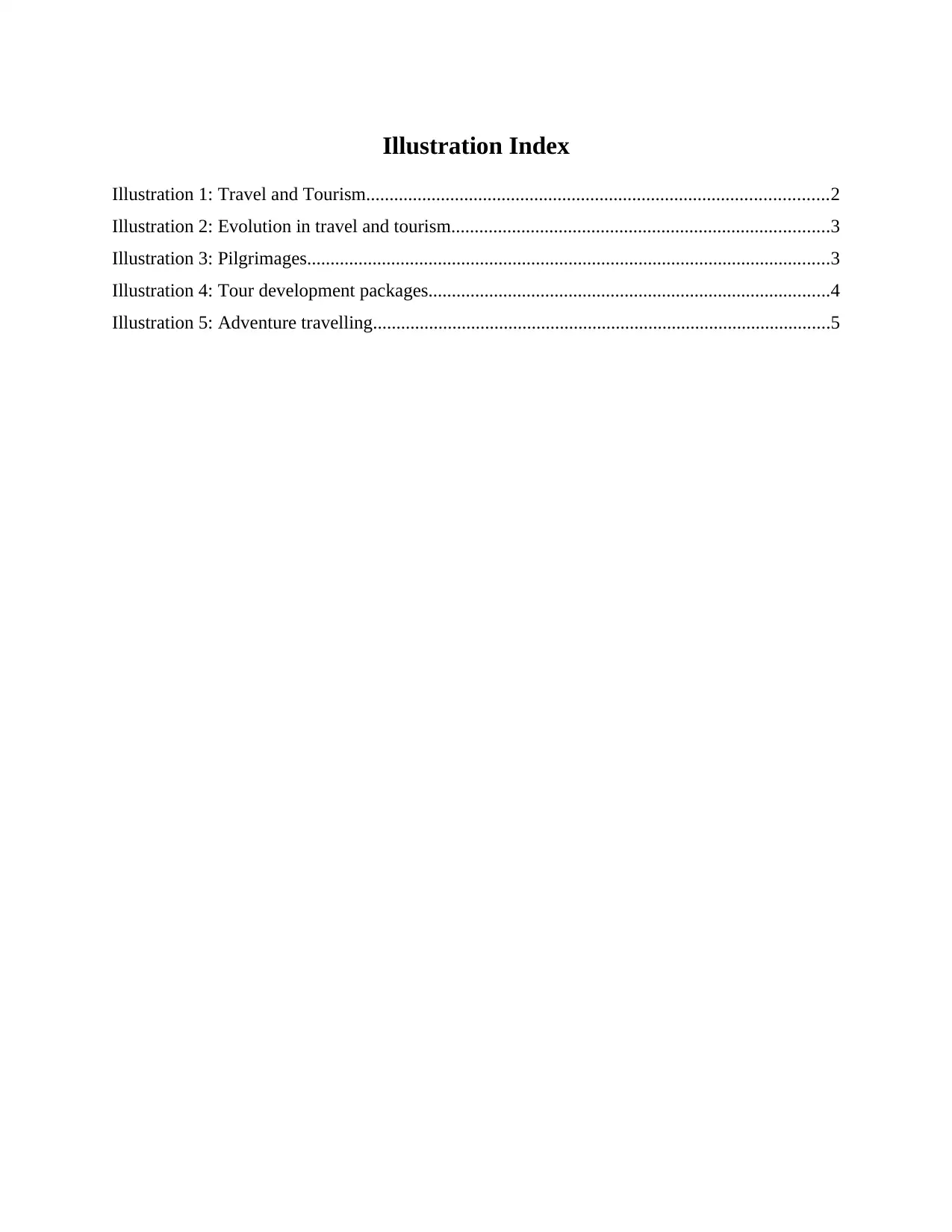
Illustration Index
Illustration 1: Travel and Tourism...................................................................................................2
Illustration 2: Evolution in travel and tourism.................................................................................3
Illustration 3: Pilgrimages................................................................................................................3
Illustration 4: Tour development packages......................................................................................4
Illustration 5: Adventure travelling..................................................................................................5
Illustration 1: Travel and Tourism...................................................................................................2
Illustration 2: Evolution in travel and tourism.................................................................................3
Illustration 3: Pilgrimages................................................................................................................3
Illustration 4: Tour development packages......................................................................................4
Illustration 5: Adventure travelling..................................................................................................5
⊘ This is a preview!⊘
Do you want full access?
Subscribe today to unlock all pages.

Trusted by 1+ million students worldwide
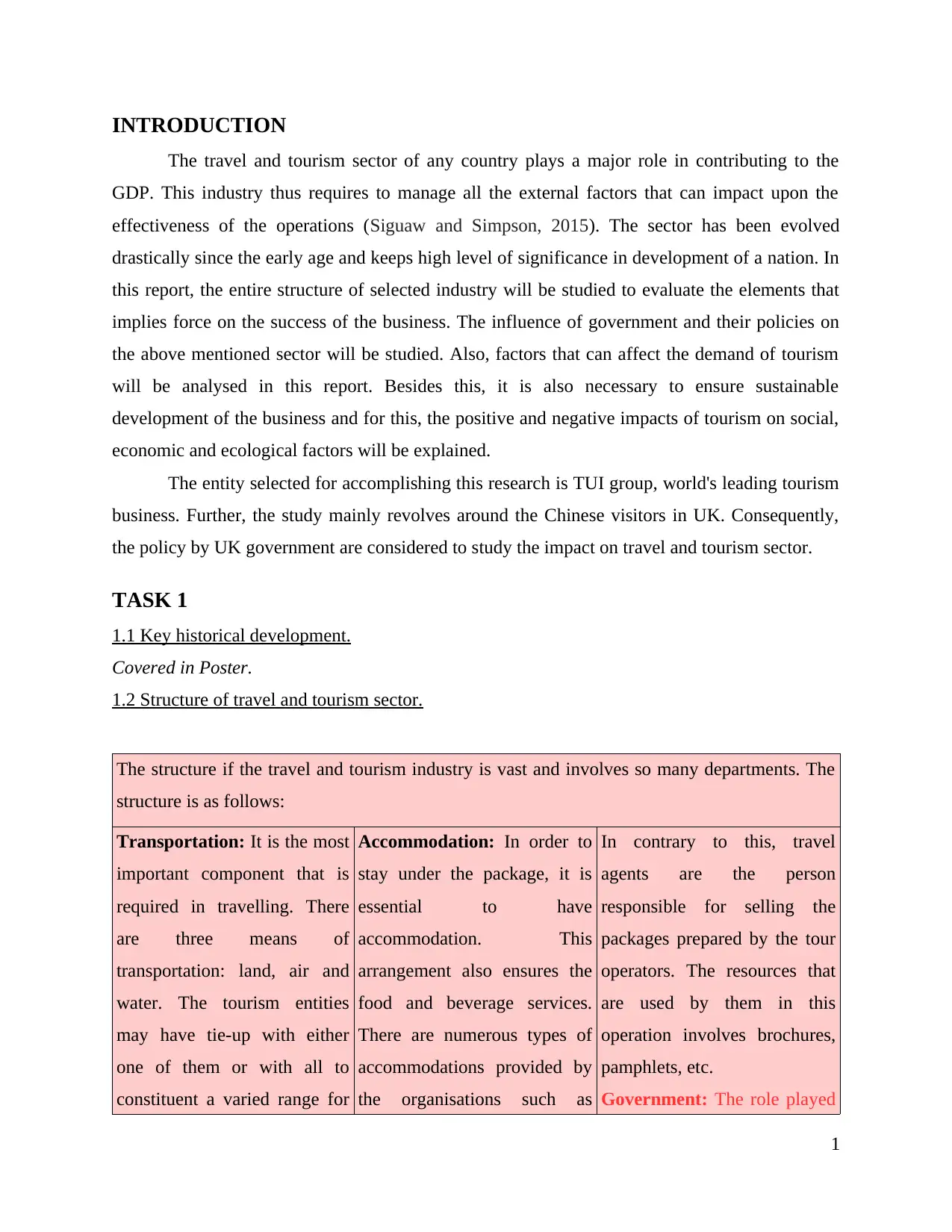
INTRODUCTION
The travel and tourism sector of any country plays a major role in contributing to the
GDP. This industry thus requires to manage all the external factors that can impact upon the
effectiveness of the operations (Siguaw and Simpson, 2015). The sector has been evolved
drastically since the early age and keeps high level of significance in development of a nation. In
this report, the entire structure of selected industry will be studied to evaluate the elements that
implies force on the success of the business. The influence of government and their policies on
the above mentioned sector will be studied. Also, factors that can affect the demand of tourism
will be analysed in this report. Besides this, it is also necessary to ensure sustainable
development of the business and for this, the positive and negative impacts of tourism on social,
economic and ecological factors will be explained.
The entity selected for accomplishing this research is TUI group, world's leading tourism
business. Further, the study mainly revolves around the Chinese visitors in UK. Consequently,
the policy by UK government are considered to study the impact on travel and tourism sector.
TASK 1
1.1 Key historical development.
Covered in Poster.
1.2 Structure of travel and tourism sector.
The structure if the travel and tourism industry is vast and involves so many departments. The
structure is as follows:
Transportation: It is the most
important component that is
required in travelling. There
are three means of
transportation: land, air and
water. The tourism entities
may have tie-up with either
one of them or with all to
constituent a varied range for
Accommodation: In order to
stay under the package, it is
essential to have
accommodation. This
arrangement also ensures the
food and beverage services.
There are numerous types of
accommodations provided by
the organisations such as
In contrary to this, travel
agents are the person
responsible for selling the
packages prepared by the tour
operators. The resources that
are used by them in this
operation involves brochures,
pamphlets, etc.
Government: The role played
1
The travel and tourism sector of any country plays a major role in contributing to the
GDP. This industry thus requires to manage all the external factors that can impact upon the
effectiveness of the operations (Siguaw and Simpson, 2015). The sector has been evolved
drastically since the early age and keeps high level of significance in development of a nation. In
this report, the entire structure of selected industry will be studied to evaluate the elements that
implies force on the success of the business. The influence of government and their policies on
the above mentioned sector will be studied. Also, factors that can affect the demand of tourism
will be analysed in this report. Besides this, it is also necessary to ensure sustainable
development of the business and for this, the positive and negative impacts of tourism on social,
economic and ecological factors will be explained.
The entity selected for accomplishing this research is TUI group, world's leading tourism
business. Further, the study mainly revolves around the Chinese visitors in UK. Consequently,
the policy by UK government are considered to study the impact on travel and tourism sector.
TASK 1
1.1 Key historical development.
Covered in Poster.
1.2 Structure of travel and tourism sector.
The structure if the travel and tourism industry is vast and involves so many departments. The
structure is as follows:
Transportation: It is the most
important component that is
required in travelling. There
are three means of
transportation: land, air and
water. The tourism entities
may have tie-up with either
one of them or with all to
constituent a varied range for
Accommodation: In order to
stay under the package, it is
essential to have
accommodation. This
arrangement also ensures the
food and beverage services.
There are numerous types of
accommodations provided by
the organisations such as
In contrary to this, travel
agents are the person
responsible for selling the
packages prepared by the tour
operators. The resources that
are used by them in this
operation involves brochures,
pamphlets, etc.
Government: The role played
1
Paraphrase This Document
Need a fresh take? Get an instant paraphrase of this document with our AI Paraphraser
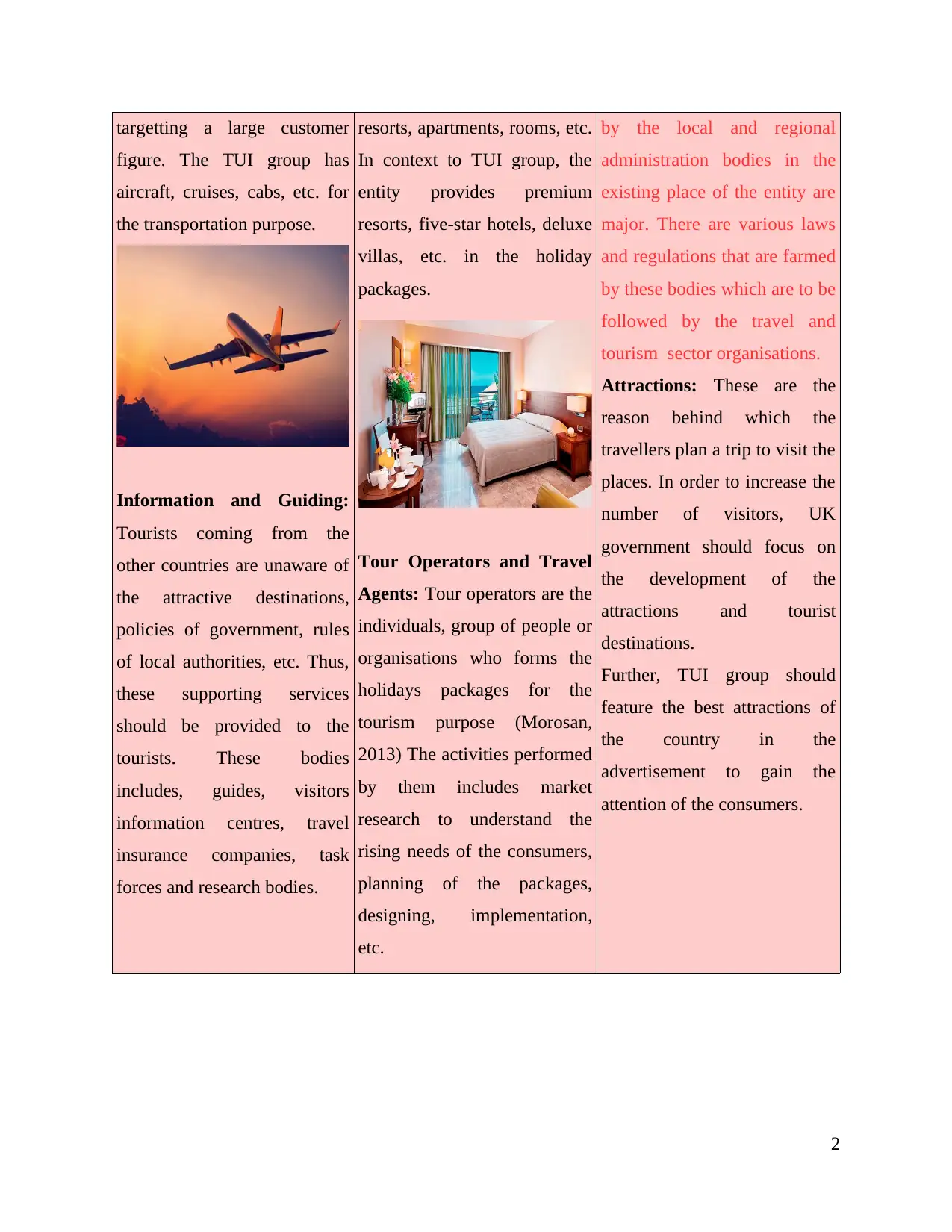
targetting a large customer
figure. The TUI group has
aircraft, cruises, cabs, etc. for
the transportation purpose.
Information and Guiding:
Tourists coming from the
other countries are unaware of
the attractive destinations,
policies of government, rules
of local authorities, etc. Thus,
these supporting services
should be provided to the
tourists. These bodies
includes, guides, visitors
information centres, travel
insurance companies, task
forces and research bodies.
resorts, apartments, rooms, etc.
In context to TUI group, the
entity provides premium
resorts, five-star hotels, deluxe
villas, etc. in the holiday
packages.
Tour Operators and Travel
Agents: Tour operators are the
individuals, group of people or
organisations who forms the
holidays packages for the
tourism purpose (Morosan,
2013) The activities performed
by them includes market
research to understand the
rising needs of the consumers,
planning of the packages,
designing, implementation,
etc.
by the local and regional
administration bodies in the
existing place of the entity are
major. There are various laws
and regulations that are farmed
by these bodies which are to be
followed by the travel and
tourism sector organisations.
Attractions: These are the
reason behind which the
travellers plan a trip to visit the
places. In order to increase the
number of visitors, UK
government should focus on
the development of the
attractions and tourist
destinations.
Further, TUI group should
feature the best attractions of
the country in the
advertisement to gain the
attention of the consumers.
2
figure. The TUI group has
aircraft, cruises, cabs, etc. for
the transportation purpose.
Information and Guiding:
Tourists coming from the
other countries are unaware of
the attractive destinations,
policies of government, rules
of local authorities, etc. Thus,
these supporting services
should be provided to the
tourists. These bodies
includes, guides, visitors
information centres, travel
insurance companies, task
forces and research bodies.
resorts, apartments, rooms, etc.
In context to TUI group, the
entity provides premium
resorts, five-star hotels, deluxe
villas, etc. in the holiday
packages.
Tour Operators and Travel
Agents: Tour operators are the
individuals, group of people or
organisations who forms the
holidays packages for the
tourism purpose (Morosan,
2013) The activities performed
by them includes market
research to understand the
rising needs of the consumers,
planning of the packages,
designing, implementation,
etc.
by the local and regional
administration bodies in the
existing place of the entity are
major. There are various laws
and regulations that are farmed
by these bodies which are to be
followed by the travel and
tourism sector organisations.
Attractions: These are the
reason behind which the
travellers plan a trip to visit the
places. In order to increase the
number of visitors, UK
government should focus on
the development of the
attractions and tourist
destinations.
Further, TUI group should
feature the best attractions of
the country in the
advertisement to gain the
attention of the consumers.
2
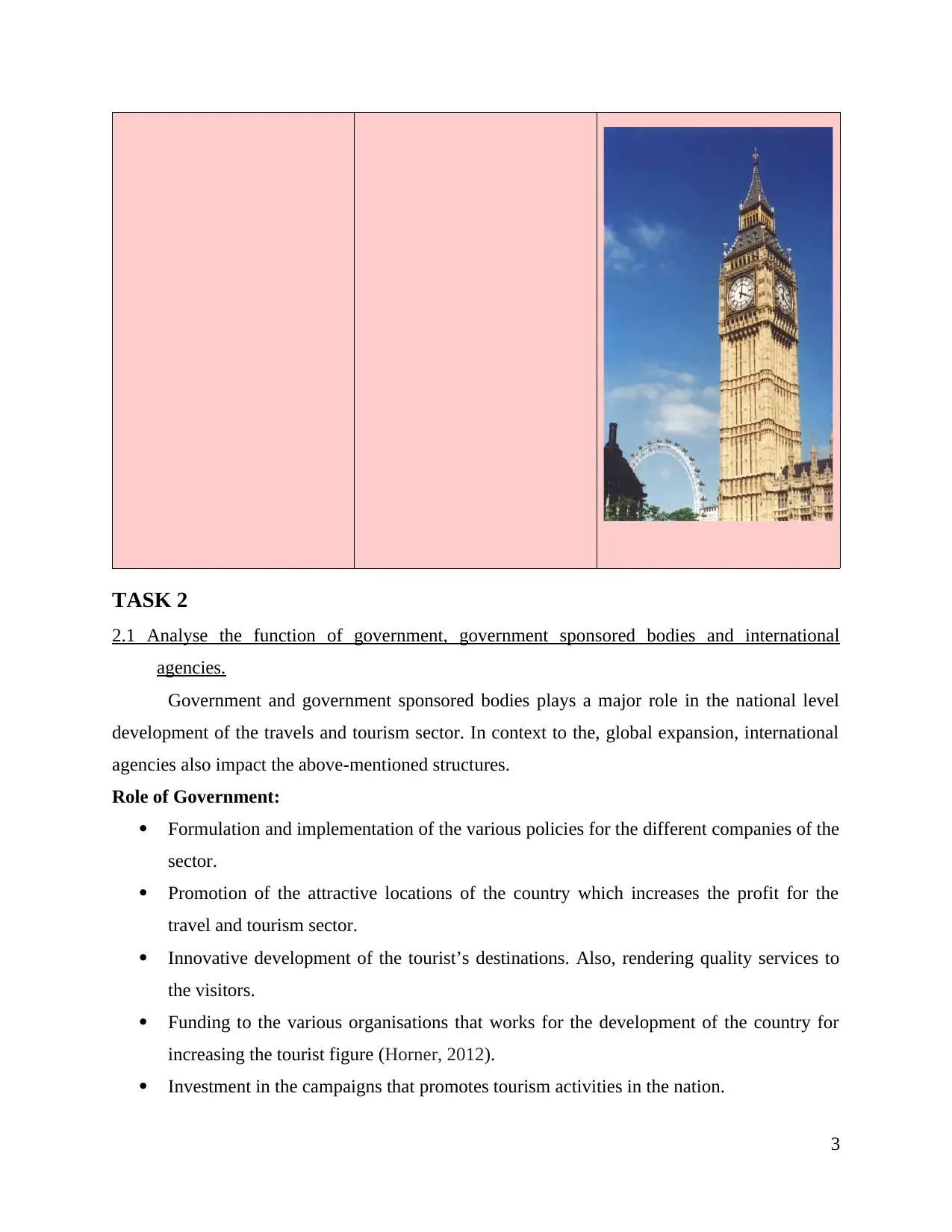
TASK 2
2.1 Analyse the function of government, government sponsored bodies and international
agencies.
Government and government sponsored bodies plays a major role in the national level
development of the travels and tourism sector. In context to the, global expansion, international
agencies also impact the above-mentioned structures.
Role of Government:
Formulation and implementation of the various policies for the different companies of the
sector.
Promotion of the attractive locations of the country which increases the profit for the
travel and tourism sector.
Innovative development of the tourist’s destinations. Also, rendering quality services to
the visitors.
Funding to the various organisations that works for the development of the country for
increasing the tourist figure (Horner, 2012).
Investment in the campaigns that promotes tourism activities in the nation.
3
2.1 Analyse the function of government, government sponsored bodies and international
agencies.
Government and government sponsored bodies plays a major role in the national level
development of the travels and tourism sector. In context to the, global expansion, international
agencies also impact the above-mentioned structures.
Role of Government:
Formulation and implementation of the various policies for the different companies of the
sector.
Promotion of the attractive locations of the country which increases the profit for the
travel and tourism sector.
Innovative development of the tourist’s destinations. Also, rendering quality services to
the visitors.
Funding to the various organisations that works for the development of the country for
increasing the tourist figure (Horner, 2012).
Investment in the campaigns that promotes tourism activities in the nation.
3
⊘ This is a preview!⊘
Do you want full access?
Subscribe today to unlock all pages.

Trusted by 1+ million students worldwide
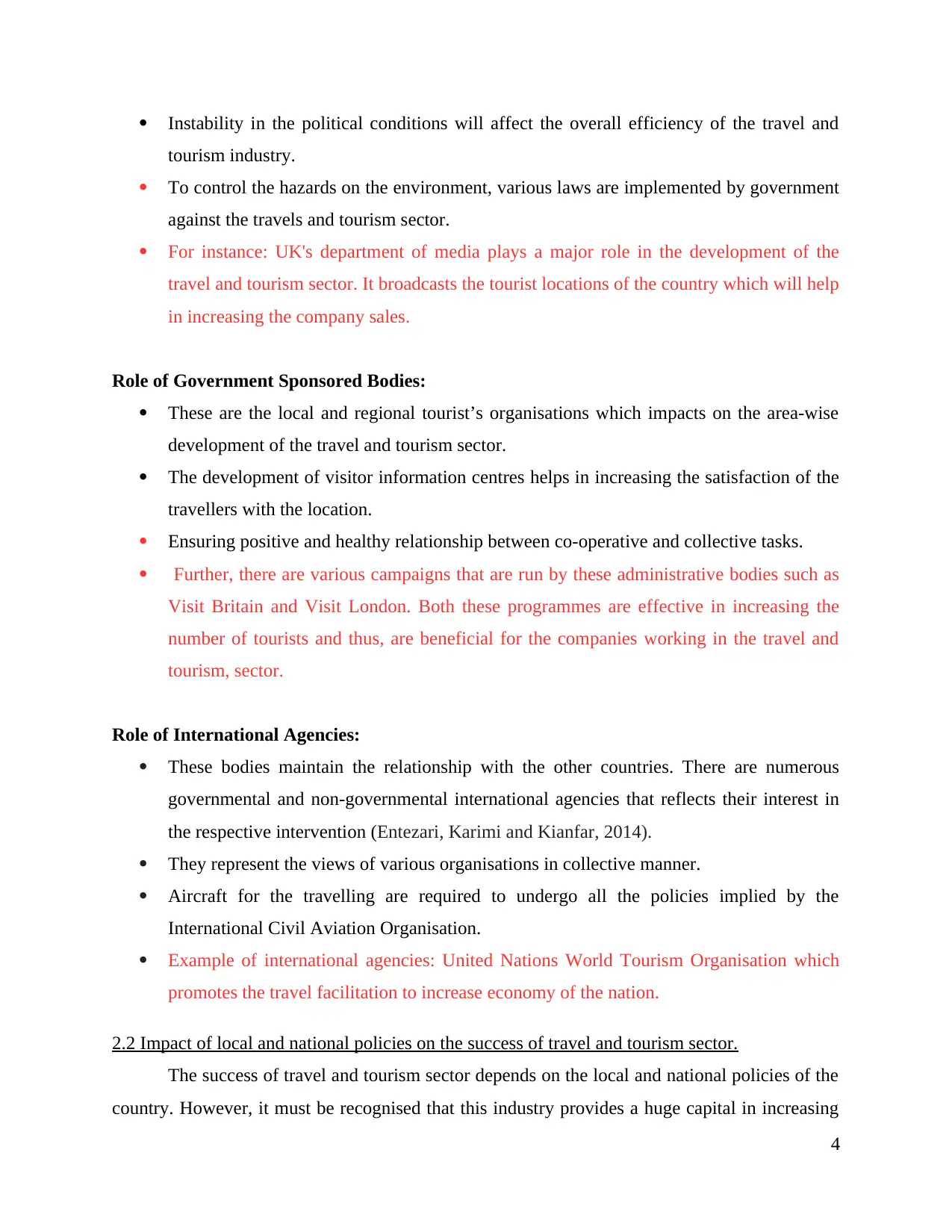
Instability in the political conditions will affect the overall efficiency of the travel and
tourism industry.
To control the hazards on the environment, various laws are implemented by government
against the travels and tourism sector.
For instance: UK's department of media plays a major role in the development of the
travel and tourism sector. It broadcasts the tourist locations of the country which will help
in increasing the company sales.
Role of Government Sponsored Bodies:
These are the local and regional tourist’s organisations which impacts on the area-wise
development of the travel and tourism sector.
The development of visitor information centres helps in increasing the satisfaction of the
travellers with the location.
Ensuring positive and healthy relationship between co-operative and collective tasks.
Further, there are various campaigns that are run by these administrative bodies such as
Visit Britain and Visit London. Both these programmes are effective in increasing the
number of tourists and thus, are beneficial for the companies working in the travel and
tourism, sector.
Role of International Agencies:
These bodies maintain the relationship with the other countries. There are numerous
governmental and non-governmental international agencies that reflects their interest in
the respective intervention (Entezari, Karimi and Kianfar, 2014).
They represent the views of various organisations in collective manner.
Aircraft for the travelling are required to undergo all the policies implied by the
International Civil Aviation Organisation.
Example of international agencies: United Nations World Tourism Organisation which
promotes the travel facilitation to increase economy of the nation.
2.2 Impact of local and national policies on the success of travel and tourism sector.
The success of travel and tourism sector depends on the local and national policies of the
country. However, it must be recognised that this industry provides a huge capital in increasing
4
tourism industry.
To control the hazards on the environment, various laws are implemented by government
against the travels and tourism sector.
For instance: UK's department of media plays a major role in the development of the
travel and tourism sector. It broadcasts the tourist locations of the country which will help
in increasing the company sales.
Role of Government Sponsored Bodies:
These are the local and regional tourist’s organisations which impacts on the area-wise
development of the travel and tourism sector.
The development of visitor information centres helps in increasing the satisfaction of the
travellers with the location.
Ensuring positive and healthy relationship between co-operative and collective tasks.
Further, there are various campaigns that are run by these administrative bodies such as
Visit Britain and Visit London. Both these programmes are effective in increasing the
number of tourists and thus, are beneficial for the companies working in the travel and
tourism, sector.
Role of International Agencies:
These bodies maintain the relationship with the other countries. There are numerous
governmental and non-governmental international agencies that reflects their interest in
the respective intervention (Entezari, Karimi and Kianfar, 2014).
They represent the views of various organisations in collective manner.
Aircraft for the travelling are required to undergo all the policies implied by the
International Civil Aviation Organisation.
Example of international agencies: United Nations World Tourism Organisation which
promotes the travel facilitation to increase economy of the nation.
2.2 Impact of local and national policies on the success of travel and tourism sector.
The success of travel and tourism sector depends on the local and national policies of the
country. However, it must be recognised that this industry provides a huge capital in increasing
4
Paraphrase This Document
Need a fresh take? Get an instant paraphrase of this document with our AI Paraphraser
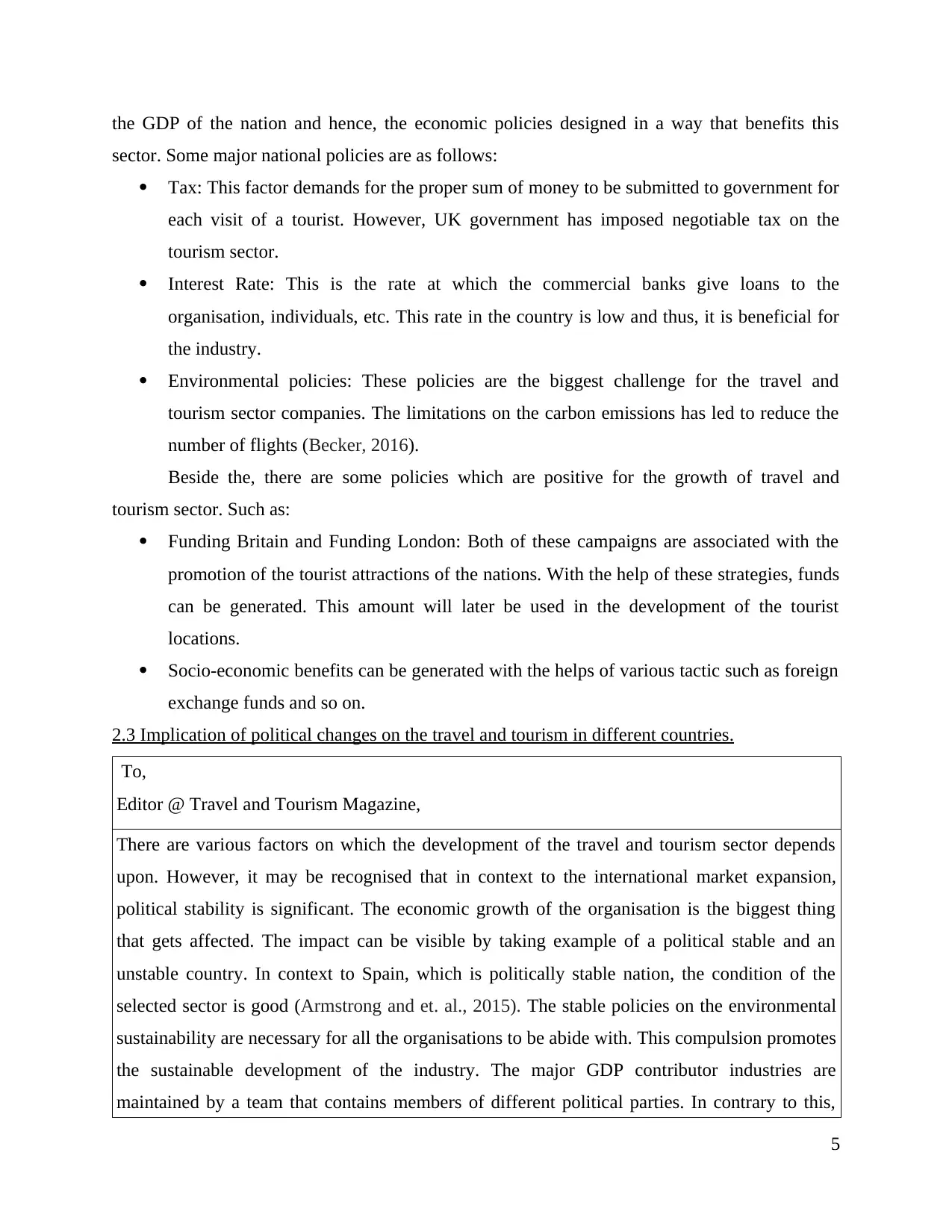
the GDP of the nation and hence, the economic policies designed in a way that benefits this
sector. Some major national policies are as follows:
Tax: This factor demands for the proper sum of money to be submitted to government for
each visit of a tourist. However, UK government has imposed negotiable tax on the
tourism sector.
Interest Rate: This is the rate at which the commercial banks give loans to the
organisation, individuals, etc. This rate in the country is low and thus, it is beneficial for
the industry.
Environmental policies: These policies are the biggest challenge for the travel and
tourism sector companies. The limitations on the carbon emissions has led to reduce the
number of flights (Becker, 2016).
Beside the, there are some policies which are positive for the growth of travel and
tourism sector. Such as:
Funding Britain and Funding London: Both of these campaigns are associated with the
promotion of the tourist attractions of the nations. With the help of these strategies, funds
can be generated. This amount will later be used in the development of the tourist
locations.
Socio-economic benefits can be generated with the helps of various tactic such as foreign
exchange funds and so on.
2.3 Implication of political changes on the travel and tourism in different countries.
To,
Editor @ Travel and Tourism Magazine,
There are various factors on which the development of the travel and tourism sector depends
upon. However, it may be recognised that in context to the international market expansion,
political stability is significant. The economic growth of the organisation is the biggest thing
that gets affected. The impact can be visible by taking example of a political stable and an
unstable country. In context to Spain, which is politically stable nation, the condition of the
selected sector is good (Armstrong and et. al., 2015). The stable policies on the environmental
sustainability are necessary for all the organisations to be abide with. This compulsion promotes
the sustainable development of the industry. The major GDP contributor industries are
maintained by a team that contains members of different political parties. In contrary to this,
5
sector. Some major national policies are as follows:
Tax: This factor demands for the proper sum of money to be submitted to government for
each visit of a tourist. However, UK government has imposed negotiable tax on the
tourism sector.
Interest Rate: This is the rate at which the commercial banks give loans to the
organisation, individuals, etc. This rate in the country is low and thus, it is beneficial for
the industry.
Environmental policies: These policies are the biggest challenge for the travel and
tourism sector companies. The limitations on the carbon emissions has led to reduce the
number of flights (Becker, 2016).
Beside the, there are some policies which are positive for the growth of travel and
tourism sector. Such as:
Funding Britain and Funding London: Both of these campaigns are associated with the
promotion of the tourist attractions of the nations. With the help of these strategies, funds
can be generated. This amount will later be used in the development of the tourist
locations.
Socio-economic benefits can be generated with the helps of various tactic such as foreign
exchange funds and so on.
2.3 Implication of political changes on the travel and tourism in different countries.
To,
Editor @ Travel and Tourism Magazine,
There are various factors on which the development of the travel and tourism sector depends
upon. However, it may be recognised that in context to the international market expansion,
political stability is significant. The economic growth of the organisation is the biggest thing
that gets affected. The impact can be visible by taking example of a political stable and an
unstable country. In context to Spain, which is politically stable nation, the condition of the
selected sector is good (Armstrong and et. al., 2015). The stable policies on the environmental
sustainability are necessary for all the organisations to be abide with. This compulsion promotes
the sustainable development of the industry. The major GDP contributor industries are
maintained by a team that contains members of different political parties. In contrary to this,
5
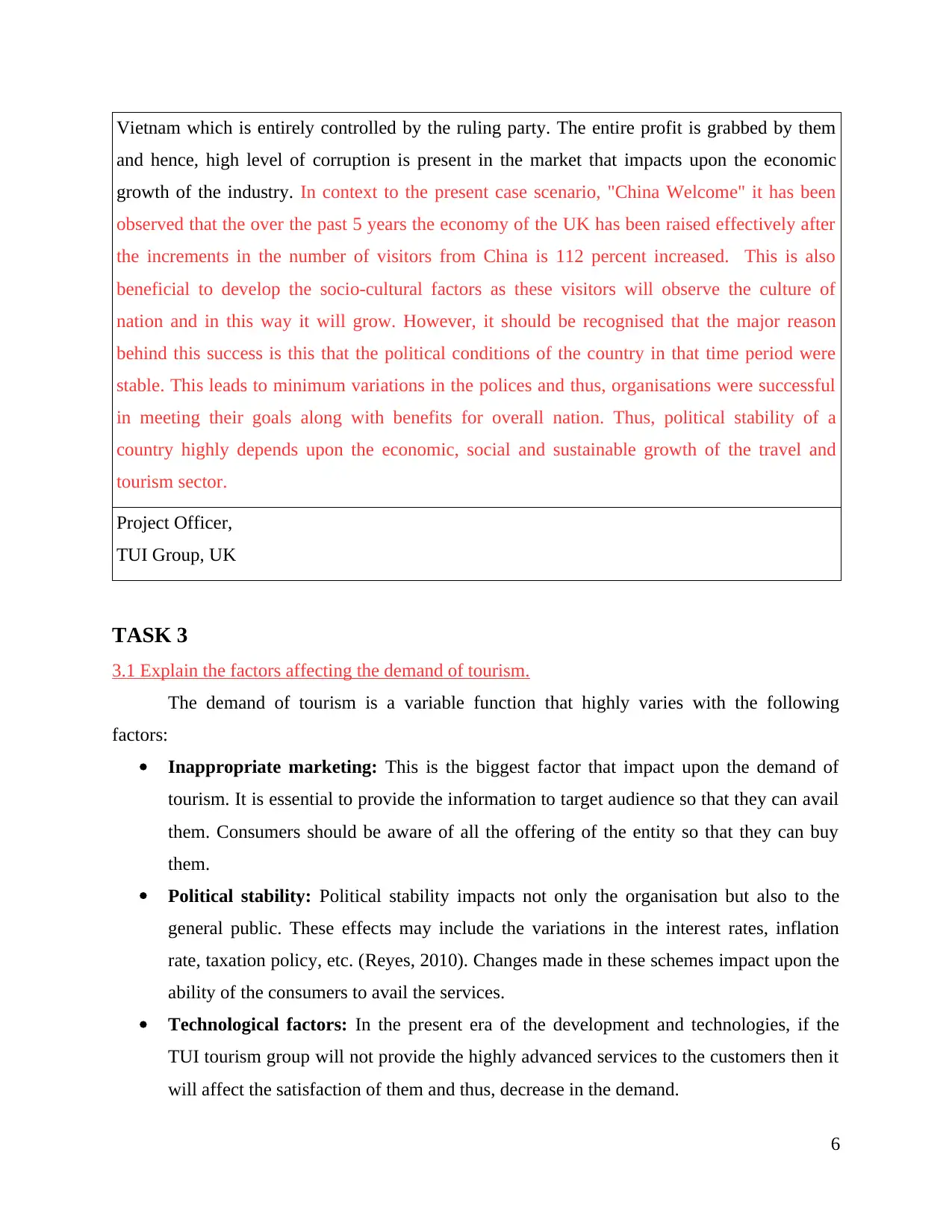
Vietnam which is entirely controlled by the ruling party. The entire profit is grabbed by them
and hence, high level of corruption is present in the market that impacts upon the economic
growth of the industry. In context to the present case scenario, "China Welcome" it has been
observed that the over the past 5 years the economy of the UK has been raised effectively after
the increments in the number of visitors from China is 112 percent increased. This is also
beneficial to develop the socio-cultural factors as these visitors will observe the culture of
nation and in this way it will grow. However, it should be recognised that the major reason
behind this success is this that the political conditions of the country in that time period were
stable. This leads to minimum variations in the polices and thus, organisations were successful
in meeting their goals along with benefits for overall nation. Thus, political stability of a
country highly depends upon the economic, social and sustainable growth of the travel and
tourism sector.
Project Officer,
TUI Group, UK
TASK 3
3.1 Explain the factors affecting the demand of tourism.
The demand of tourism is a variable function that highly varies with the following
factors:
Inappropriate marketing: This is the biggest factor that impact upon the demand of
tourism. It is essential to provide the information to target audience so that they can avail
them. Consumers should be aware of all the offering of the entity so that they can buy
them.
Political stability: Political stability impacts not only the organisation but also to the
general public. These effects may include the variations in the interest rates, inflation
rate, taxation policy, etc. (Reyes, 2010). Changes made in these schemes impact upon the
ability of the consumers to avail the services.
Technological factors: In the present era of the development and technologies, if the
TUI tourism group will not provide the highly advanced services to the customers then it
will affect the satisfaction of them and thus, decrease in the demand.
6
and hence, high level of corruption is present in the market that impacts upon the economic
growth of the industry. In context to the present case scenario, "China Welcome" it has been
observed that the over the past 5 years the economy of the UK has been raised effectively after
the increments in the number of visitors from China is 112 percent increased. This is also
beneficial to develop the socio-cultural factors as these visitors will observe the culture of
nation and in this way it will grow. However, it should be recognised that the major reason
behind this success is this that the political conditions of the country in that time period were
stable. This leads to minimum variations in the polices and thus, organisations were successful
in meeting their goals along with benefits for overall nation. Thus, political stability of a
country highly depends upon the economic, social and sustainable growth of the travel and
tourism sector.
Project Officer,
TUI Group, UK
TASK 3
3.1 Explain the factors affecting the demand of tourism.
The demand of tourism is a variable function that highly varies with the following
factors:
Inappropriate marketing: This is the biggest factor that impact upon the demand of
tourism. It is essential to provide the information to target audience so that they can avail
them. Consumers should be aware of all the offering of the entity so that they can buy
them.
Political stability: Political stability impacts not only the organisation but also to the
general public. These effects may include the variations in the interest rates, inflation
rate, taxation policy, etc. (Reyes, 2010). Changes made in these schemes impact upon the
ability of the consumers to avail the services.
Technological factors: In the present era of the development and technologies, if the
TUI tourism group will not provide the highly advanced services to the customers then it
will affect the satisfaction of them and thus, decrease in the demand.
6
⊘ This is a preview!⊘
Do you want full access?
Subscribe today to unlock all pages.

Trusted by 1+ million students worldwide
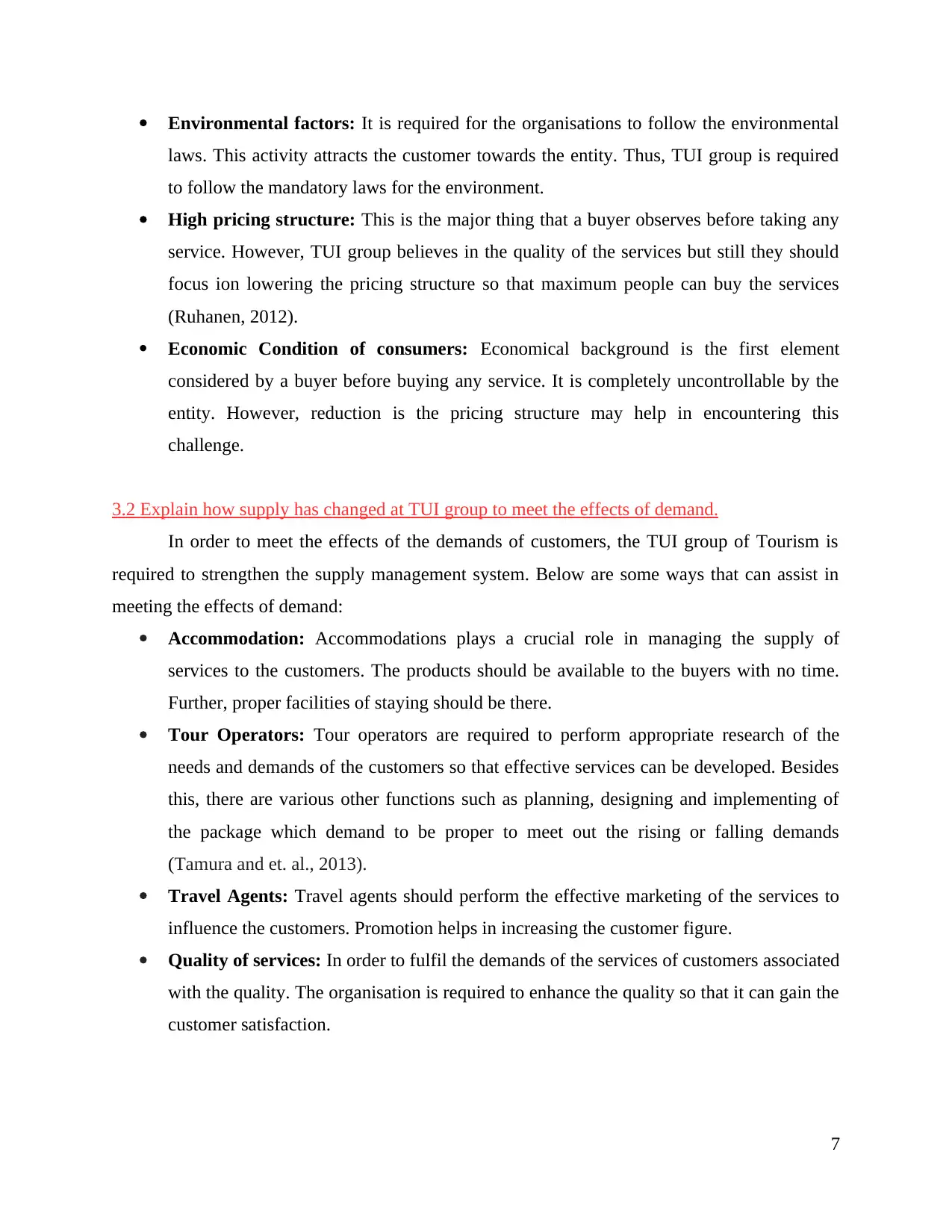
Environmental factors: It is required for the organisations to follow the environmental
laws. This activity attracts the customer towards the entity. Thus, TUI group is required
to follow the mandatory laws for the environment.
High pricing structure: This is the major thing that a buyer observes before taking any
service. However, TUI group believes in the quality of the services but still they should
focus ion lowering the pricing structure so that maximum people can buy the services
(Ruhanen, 2012).
Economic Condition of consumers: Economical background is the first element
considered by a buyer before buying any service. It is completely uncontrollable by the
entity. However, reduction is the pricing structure may help in encountering this
challenge.
3.2 Explain how supply has changed at TUI group to meet the effects of demand.
In order to meet the effects of the demands of customers, the TUI group of Tourism is
required to strengthen the supply management system. Below are some ways that can assist in
meeting the effects of demand:
Accommodation: Accommodations plays a crucial role in managing the supply of
services to the customers. The products should be available to the buyers with no time.
Further, proper facilities of staying should be there.
Tour Operators: Tour operators are required to perform appropriate research of the
needs and demands of the customers so that effective services can be developed. Besides
this, there are various other functions such as planning, designing and implementing of
the package which demand to be proper to meet out the rising or falling demands
(Tamura and et. al., 2013).
Travel Agents: Travel agents should perform the effective marketing of the services to
influence the customers. Promotion helps in increasing the customer figure.
Quality of services: In order to fulfil the demands of the services of customers associated
with the quality. The organisation is required to enhance the quality so that it can gain the
customer satisfaction.
7
laws. This activity attracts the customer towards the entity. Thus, TUI group is required
to follow the mandatory laws for the environment.
High pricing structure: This is the major thing that a buyer observes before taking any
service. However, TUI group believes in the quality of the services but still they should
focus ion lowering the pricing structure so that maximum people can buy the services
(Ruhanen, 2012).
Economic Condition of consumers: Economical background is the first element
considered by a buyer before buying any service. It is completely uncontrollable by the
entity. However, reduction is the pricing structure may help in encountering this
challenge.
3.2 Explain how supply has changed at TUI group to meet the effects of demand.
In order to meet the effects of the demands of customers, the TUI group of Tourism is
required to strengthen the supply management system. Below are some ways that can assist in
meeting the effects of demand:
Accommodation: Accommodations plays a crucial role in managing the supply of
services to the customers. The products should be available to the buyers with no time.
Further, proper facilities of staying should be there.
Tour Operators: Tour operators are required to perform appropriate research of the
needs and demands of the customers so that effective services can be developed. Besides
this, there are various other functions such as planning, designing and implementing of
the package which demand to be proper to meet out the rising or falling demands
(Tamura and et. al., 2013).
Travel Agents: Travel agents should perform the effective marketing of the services to
influence the customers. Promotion helps in increasing the customer figure.
Quality of services: In order to fulfil the demands of the services of customers associated
with the quality. The organisation is required to enhance the quality so that it can gain the
customer satisfaction.
7
Paraphrase This Document
Need a fresh take? Get an instant paraphrase of this document with our AI Paraphraser
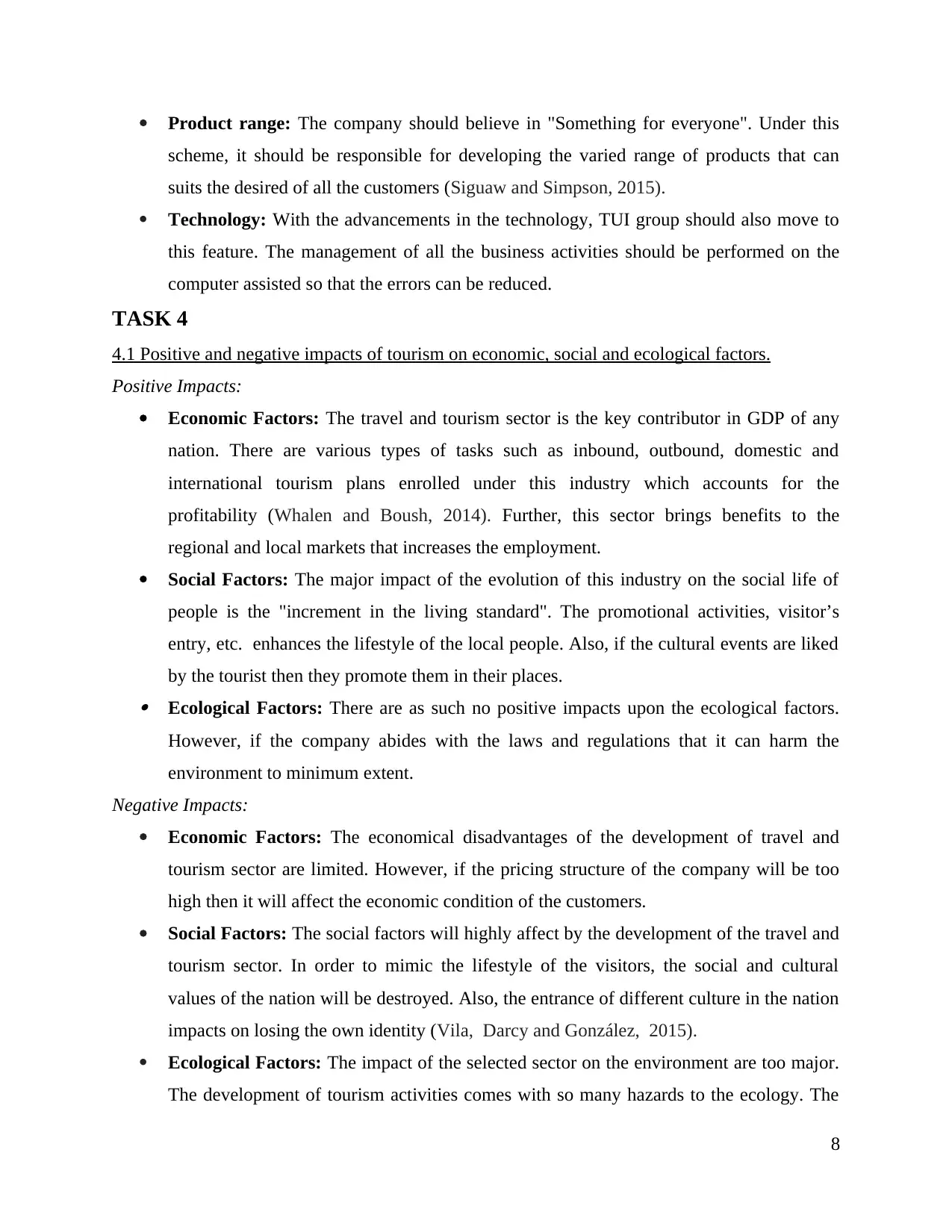
Product range: The company should believe in "Something for everyone". Under this
scheme, it should be responsible for developing the varied range of products that can
suits the desired of all the customers (Siguaw and Simpson, 2015).
Technology: With the advancements in the technology, TUI group should also move to
this feature. The management of all the business activities should be performed on the
computer assisted so that the errors can be reduced.
TASK 4
4.1 Positive and negative impacts of tourism on economic, social and ecological factors.
Positive Impacts:
Economic Factors: The travel and tourism sector is the key contributor in GDP of any
nation. There are various types of tasks such as inbound, outbound, domestic and
international tourism plans enrolled under this industry which accounts for the
profitability (Whalen and Boush, 2014). Further, this sector brings benefits to the
regional and local markets that increases the employment.
Social Factors: The major impact of the evolution of this industry on the social life of
people is the "increment in the living standard". The promotional activities, visitor’s
entry, etc. enhances the lifestyle of the local people. Also, if the cultural events are liked
by the tourist then they promote them in their places. Ecological Factors: There are as such no positive impacts upon the ecological factors.
However, if the company abides with the laws and regulations that it can harm the
environment to minimum extent.
Negative Impacts:
Economic Factors: The economical disadvantages of the development of travel and
tourism sector are limited. However, if the pricing structure of the company will be too
high then it will affect the economic condition of the customers.
Social Factors: The social factors will highly affect by the development of the travel and
tourism sector. In order to mimic the lifestyle of the visitors, the social and cultural
values of the nation will be destroyed. Also, the entrance of different culture in the nation
impacts on losing the own identity (Vila, Darcy and González, 2015).
Ecological Factors: The impact of the selected sector on the environment are too major.
The development of tourism activities comes with so many hazards to the ecology. The
8
scheme, it should be responsible for developing the varied range of products that can
suits the desired of all the customers (Siguaw and Simpson, 2015).
Technology: With the advancements in the technology, TUI group should also move to
this feature. The management of all the business activities should be performed on the
computer assisted so that the errors can be reduced.
TASK 4
4.1 Positive and negative impacts of tourism on economic, social and ecological factors.
Positive Impacts:
Economic Factors: The travel and tourism sector is the key contributor in GDP of any
nation. There are various types of tasks such as inbound, outbound, domestic and
international tourism plans enrolled under this industry which accounts for the
profitability (Whalen and Boush, 2014). Further, this sector brings benefits to the
regional and local markets that increases the employment.
Social Factors: The major impact of the evolution of this industry on the social life of
people is the "increment in the living standard". The promotional activities, visitor’s
entry, etc. enhances the lifestyle of the local people. Also, if the cultural events are liked
by the tourist then they promote them in their places. Ecological Factors: There are as such no positive impacts upon the ecological factors.
However, if the company abides with the laws and regulations that it can harm the
environment to minimum extent.
Negative Impacts:
Economic Factors: The economical disadvantages of the development of travel and
tourism sector are limited. However, if the pricing structure of the company will be too
high then it will affect the economic condition of the customers.
Social Factors: The social factors will highly affect by the development of the travel and
tourism sector. In order to mimic the lifestyle of the visitors, the social and cultural
values of the nation will be destroyed. Also, the entrance of different culture in the nation
impacts on losing the own identity (Vila, Darcy and González, 2015).
Ecological Factors: The impact of the selected sector on the environment are too major.
The development of tourism activities comes with so many hazards to the ecology. The
8
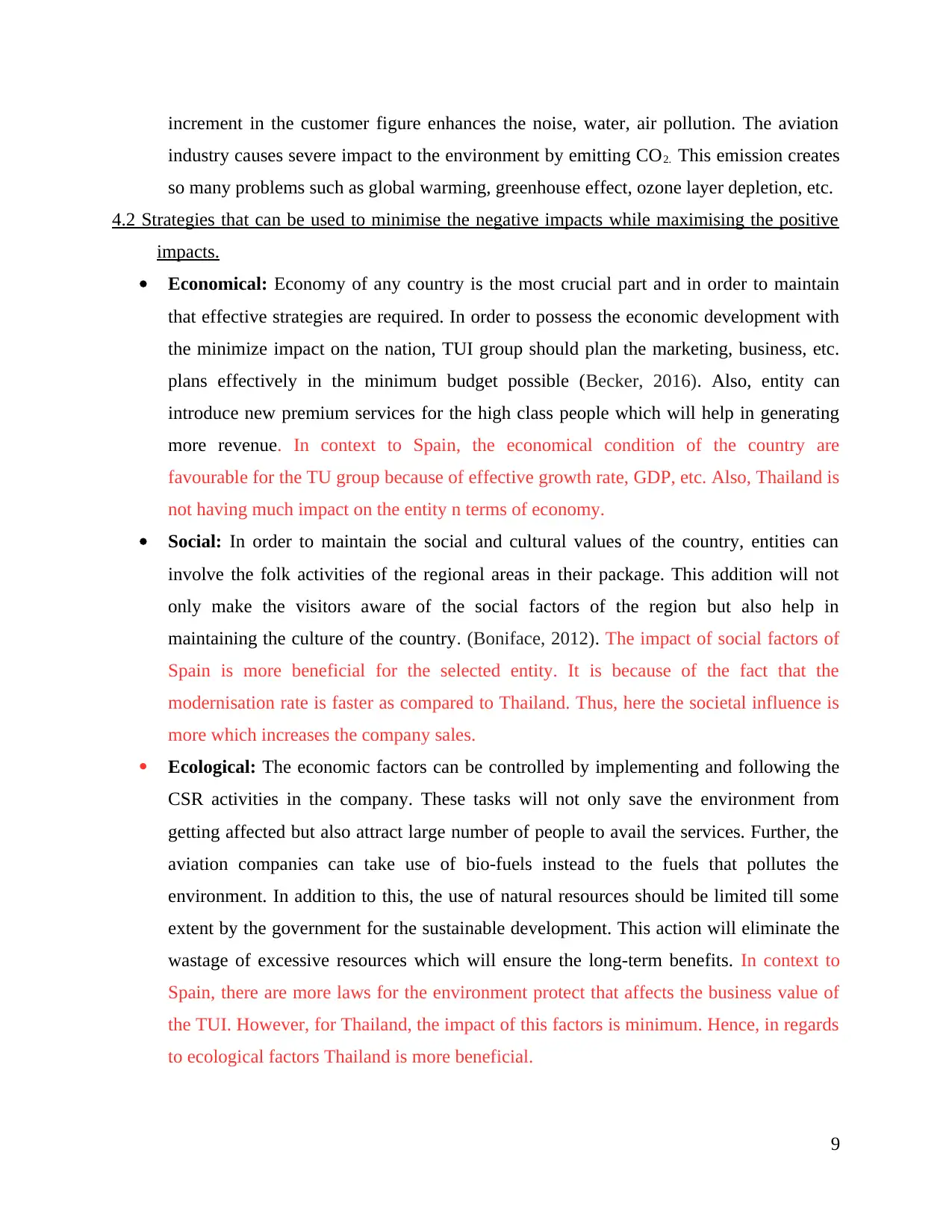
increment in the customer figure enhances the noise, water, air pollution. The aviation
industry causes severe impact to the environment by emitting CO2. This emission creates
so many problems such as global warming, greenhouse effect, ozone layer depletion, etc.
4.2 Strategies that can be used to minimise the negative impacts while maximising the positive
impacts.
Economical: Economy of any country is the most crucial part and in order to maintain
that effective strategies are required. In order to possess the economic development with
the minimize impact on the nation, TUI group should plan the marketing, business, etc.
plans effectively in the minimum budget possible (Becker, 2016). Also, entity can
introduce new premium services for the high class people which will help in generating
more revenue. In context to Spain, the economical condition of the country are
favourable for the TU group because of effective growth rate, GDP, etc. Also, Thailand is
not having much impact on the entity n terms of economy.
Social: In order to maintain the social and cultural values of the country, entities can
involve the folk activities of the regional areas in their package. This addition will not
only make the visitors aware of the social factors of the region but also help in
maintaining the culture of the country. (Boniface, 2012). The impact of social factors of
Spain is more beneficial for the selected entity. It is because of the fact that the
modernisation rate is faster as compared to Thailand. Thus, here the societal influence is
more which increases the company sales.
Ecological: The economic factors can be controlled by implementing and following the
CSR activities in the company. These tasks will not only save the environment from
getting affected but also attract large number of people to avail the services. Further, the
aviation companies can take use of bio-fuels instead to the fuels that pollutes the
environment. In addition to this, the use of natural resources should be limited till some
extent by the government for the sustainable development. This action will eliminate the
wastage of excessive resources which will ensure the long-term benefits. In context to
Spain, there are more laws for the environment protect that affects the business value of
the TUI. However, for Thailand, the impact of this factors is minimum. Hence, in regards
to ecological factors Thailand is more beneficial.
9
industry causes severe impact to the environment by emitting CO2. This emission creates
so many problems such as global warming, greenhouse effect, ozone layer depletion, etc.
4.2 Strategies that can be used to minimise the negative impacts while maximising the positive
impacts.
Economical: Economy of any country is the most crucial part and in order to maintain
that effective strategies are required. In order to possess the economic development with
the minimize impact on the nation, TUI group should plan the marketing, business, etc.
plans effectively in the minimum budget possible (Becker, 2016). Also, entity can
introduce new premium services for the high class people which will help in generating
more revenue. In context to Spain, the economical condition of the country are
favourable for the TU group because of effective growth rate, GDP, etc. Also, Thailand is
not having much impact on the entity n terms of economy.
Social: In order to maintain the social and cultural values of the country, entities can
involve the folk activities of the regional areas in their package. This addition will not
only make the visitors aware of the social factors of the region but also help in
maintaining the culture of the country. (Boniface, 2012). The impact of social factors of
Spain is more beneficial for the selected entity. It is because of the fact that the
modernisation rate is faster as compared to Thailand. Thus, here the societal influence is
more which increases the company sales.
Ecological: The economic factors can be controlled by implementing and following the
CSR activities in the company. These tasks will not only save the environment from
getting affected but also attract large number of people to avail the services. Further, the
aviation companies can take use of bio-fuels instead to the fuels that pollutes the
environment. In addition to this, the use of natural resources should be limited till some
extent by the government for the sustainable development. This action will eliminate the
wastage of excessive resources which will ensure the long-term benefits. In context to
Spain, there are more laws for the environment protect that affects the business value of
the TUI. However, for Thailand, the impact of this factors is minimum. Hence, in regards
to ecological factors Thailand is more beneficial.
9
⊘ This is a preview!⊘
Do you want full access?
Subscribe today to unlock all pages.

Trusted by 1+ million students worldwide
1 out of 14
Related Documents
Your All-in-One AI-Powered Toolkit for Academic Success.
+13062052269
info@desklib.com
Available 24*7 on WhatsApp / Email
![[object Object]](/_next/static/media/star-bottom.7253800d.svg)
Unlock your academic potential
Copyright © 2020–2026 A2Z Services. All Rights Reserved. Developed and managed by ZUCOL.





